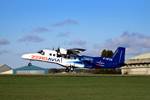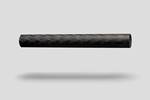HevenDrones introduces composite drones powered by hydrogen
The H2D200 series builds on the success of the company’s H100 platform, offering extended ranges and payloads via an environmentally cleaner system.
Photo Credit: Carolyn Cole/Los Angeles Times/Getty Images
(Monaco, Israel) has unveiled the H2D200 series, a drone harnessing the power of hydrogen. Complete with a carbon fiber fuselage, the new series — the H2D200 and H2D250 — builds on the success of HevenDrones’ H100 drone.
Hydrogen, with its energy density and environmental benefits, has enabled the company to push the boundaries of drone performance. The H2D200, designed to carry payloads up to 4.5 kilograms (10 pounds), is reported to represent a significant leap in endurance and precision. With a range of up to 510 kilometers and an extended flight time of up to 4 hours, it sets a new standard for smaller payload drones, all while maintaining the ability to hover with precision.
Alternately, the H2D250, engineered for larger payloads of up to 10 kilograms (22 pounds), offers a range of up to 750 kilometers and an operational time of up to 8 hours without sacrificing hover capabilities. This larger payload capacity opens doors to myriad applications, including advanced logistics missions requiring multiple deliveries.
“We are at a pivotal moment in the drone industry,” Bentzion Levinson, CEO of HevenDrones, says. The new series was revealed at a recent Monaco Hydrogen Forum. “The H2D200 Series represents not only a leap forward in drone technology but also a testament to our commitment to building a smarter ecosystem in the skies using the full power and potential of AI.”
Related Content
-
Honda begins production of 2025 CR-V e:FCEV with Type 4 hydrogen tanks in U.S.
Model includes new technologies produced at Performance Manufacturing Center (PMC) in Marysville, Ohio, which is part of Honda hydrogen business strategy that includes Class 8 trucks.
-
Plant tour: Hexagon Purus, Kassel, Germany
Fully automated, Industry 4.0 line for hydrogen pressure vessels advances efficiency and versatility in small footprint for next-gen, sustainable composites production.
-
New GTL breakthrough in composite tubing for liquid hydrogen in aircraft and space vehicles
Tests versus stainless steel tubing show 10 times faster chill down, fuel flow in 2 seconds and less boil-off for significantly faster fueling and refueling of LH2-powered space vehicles, aircraft and trucks.



